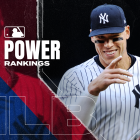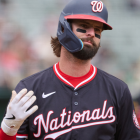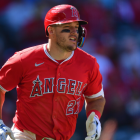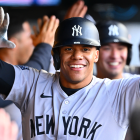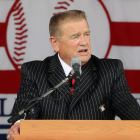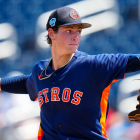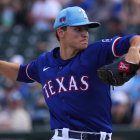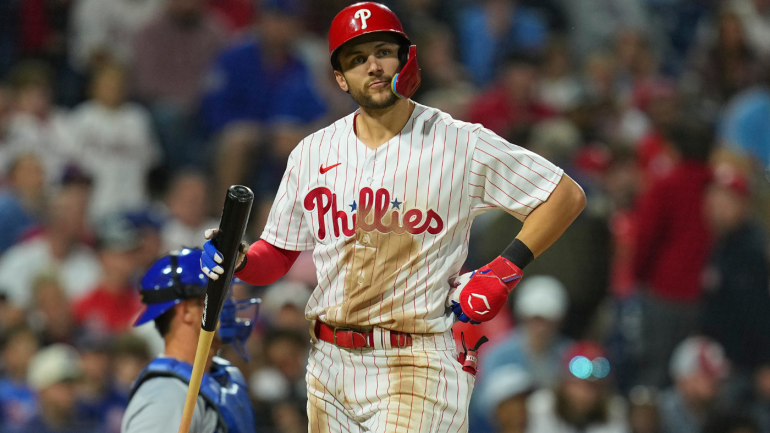
The Philadelphia Phillies have ridden the roller coaster the first two months of the 2023 season. Just within the last four weeks they've had a four-game winning streak, a six-game losing streak, a five-game winning streak, and then a five-game losing streak. Following Sunday's win (PHI 2, CHC 1), the Phillies are 22-24 and currently outside postseason position.
"It's great to play here," manager Rob Thomson told NBC Sports Philadelphia over the weekend when asked about fans supporting the team. "Even when they're booing, it's great to play here, the fan support. They let you know when you're playing poorly and they let you know when you're playing well, and that's OK."
The Phillies are well aware it is a long season and there's plenty of time to right the ship. They were 21-29 at the end of May last season, then went 66-46 the rest of the way. That strong finish earned the Phillies a postseason berth and, a few weeks later, they represented the National League in the World Series. There's plenty of time to turn things around.
That all said, Philadelphia's strong finish last year coincided with Thomson replacing Joe Girardi, and no managerial change is coming this season. It's on the players to straighten things out and get the Phillies back to the postseason. Here are four things that must happen for the Fightin' Phils to start banking wins and move up the standings.
1. Turner has to be better
That's the easiest way to put it: Trea Turner has to be better, period. The team's new $300 million shortstop is hitting .257/.300/.393 on the season and he hit more home runs with Team USA in the World Baseball Classic (five in six games) than he has with the Phillies thus far (four in 45 games). Thomson gave Turner a day off Saturday just to kind of reset.
"It's just to give him a little break," Thomson told the Trentonian about Turner's day off. "He can do some actual work with (hitting coach Kevin Long) in the cage. Just get some extra work, take a day. I just thought it was best."
Turner looks very much like a player who is pressing. He has swung at nearly 38% of the pitches he's seen outside the strike zone, far and away the highest rate of his career, and that has led to a career high (by far) 27.1% strikeout rate. There have been a few defensive lapses as well. And he's performing worse as the season has progressed, not better. Things appear to be snowballing on the two-time All-Star.
When he's right, Turner is a game-changing player on both sides of the ball with an elite power/speed combination. The Phillies have yet to see that player in their uniform. It's highly unlikely Turner is just bad now. His skills didn't deteriorate that quickly. That All-Star ability is still in there, and the Phillies must find a way to unlock it. Turner is essential to their success.

Fantasy Baseball Today Newsletter
Your Cheat Code To Fantasy Baseball
You're destined to gain an edge over your friends with advice from the award-winning FBT crew.
Thanks for signing up!
Keep an eye on your inbox.
Sorry!
There was an error processing your subscription.
2. The rotation has to pitch up to its potential
For a variety of reasons, the Phillies started Taijuan Walker on short rest Sunday afternoon. One of those reasons: Walker threw only 40 pitches in his previous start because he was pulled after allowing four runs in only two-thirds of an inning. He has a 5.79 ERA on the season after throwing 5 1/3 shutout innings against the Chicago Cubs on Sunday.
Ranger Suárez recently returned from his spring forearm injury and he's allowed seven runs in six innings in two starts. Bailey Falter, who got the No. 5 spot almost by default, was sent to Triple-A after posting a 5.13 ERA in 40 1/3 innings. The Phillies were hoping top prospect and 20-year-old phenom Andrew Painter would be a factor this year, though he suffered an elbow injury in spring training and is not particularly close to returning, let alone pitching for the big-league team.
Even co-aces Aaron Nola and Zack Wheeler have combined for a 4.20 ERA. Wheeler's underlying numbers are very strong, every bit as good as last season, suggesting better days are ahead. Nola had his best start of the season Saturday, though he's missing some velocity and the under-the-hood numbers are just OK. Including the postseason, he led baseball in innings last year, and he had a shorter offseason to recover. It's possible Nola is dealing with a bit of a World Series hangover.
"Filling up the zone," Nola told the Associated Press about the key to his strong start against the Cubs on Sunday (two runs and 10 strikeouts in seven innings). "My fastball felt really good and my curveball felt sharper."
Matt Strahm, who converted from reliever to starter out of necessity, has really saved the team's bacon. He had a 3.51 ERA in six starts earlier this season before shifting back to the bullpen, in part because he's on pace to throw more innings this year than the last three years combined (72). Without Strahm, the Phillies would be in much worse shape, and the rotation's 4.97 ERA would be much more unsightly.
There are reasons to believe the rotation will be better going forward. Wheeler's under-the-hood numbers are strong, Nola is trending upward, Suárez just returned and is in the process of settling in, and it's unlikely Walker is a true talent 5.97 ERA pitcher. The front office will have to address the No. 5 spot at some point. The top four are better than they've shown though, and really, there's not much more the Phillies can do other than wait for them to pitch to their potential. The rotation getting on track is a must.
"I worry more about the health of our players than I do wins and loses," Thomson told the Philadelphia Inquirer over the weekend. "We can work that stuff out, so when Ranger Suárez throws 66 pitches in two innings, my stress level goes up. Not that we lost the game, but that type of thing. When Taijuan throws 40 pitches in an inning, that's stuff that stresses me out more so than wins and losses, because I truly believe it'll work itself out."
3. They need to be a little more clutch
"Clutch" is extremely subjective, though it is remarkable how often the Phillies not only fail to get the big hit, but also fail to make the big pitch or big defensive play. That isn't to say the Phillies are not clutch, only that they have not been clutch to date. By and large, this is the same group of players who went to the World Series last season. You can't do that and not be clutch. I don't think these players are suddenly spooked by the big moment after rising to the occasion so often last year.
FanGraphs has a stat (conveniently called "Clutch") that measures each player's or each team's performance in high-leverage situations against their performance in all other situations. Essentially how much better or worse are they in high-leverage spots than at all other times? The Phillies rank near the bottom of the league in Clutch both offensively and on the mound.
| Offensive Clutch | Pitching Clutch |
|---|---|
30. Chicago Cubs | |
29. Minnesota Twins | |
28. San Diego Padres | 28. Chicago Cubs |
27. Kansas City Royals | 27. Seattle Mariners |
26. Philadelphia Phillies | |
24. Philadelphia Phillies | 24. Texas Rangers |
The Cubs, Royals, and Phillies are the only teams in the bottom seven of both offensive clutch and pitching clutch. Not great! Kansas City was expected to be one of the worst teams in baseball this season and they have indeed been one of the worst teams in baseball. The Cubs weren't really expected to contend and they have crashed back to Earth after a hot start. Their place near the bottom of these two leaderboards isn't terribly surprising.
Then there are the Phillies, who won the pennant last season and came into 2023 as an expected contender. For whatever reason, they have had a lot of trouble getting that big hit or making that big play on defense. It's the kind of thing that can drag a talented team down. It's correctable and it's not a fatal flaw, though it can feel like it. Bottom line, Philadelphia needs a few more big hits on offense and big outs on defense, no matter who gets 'em. The execution has been lacking.
4. Take advantage of head-to-head matchups
As part of MLB's new, more balanced schedule, every team will play the other four teams in its division 13 times each rather than 19. Fewer head-to-head games against division rivals means those games are that much more important. And, weirdly, the Phillies have not yet played the Atlanta Braves or New York Mets, the two NL East clubs they will compete with all season (sorry, Marlins and Nationals, but you're not in the same class).
That will change this coming week. The Phillies begin a three-game home series with the Arizona Diamondbacks on Monday night. After that, they head out on a 10-game road trip through Atlanta (four games), New York (three games), and Washington (three games). Seven straight games against the Braves and Mets are coming up. The Phillies also have back-to-back three-game home series against the Braves and Mets from June 20-25. Thirteen of Philadelphia's next 32 games are against the Braves and Mets.
The easiest way to make up ground is winning those head-to-head games, and although things have not gone well the last few weeks, the Phillies still control their own destiny. They have all their games remaining with the Braves and Mets. Take care of business in those games and the Phillies will be where they want to be come the end of the season.
Suárez and Bryce Harper (who is mashing) returned earlier this month and José Alvarado is a few weeks away. That's the cavalry, aside from anyone the front office brings in at the trade deadline. There's only so much helping coming, so a turnaround for the Phillies depends on the rotation and Turner, and also turning all those head-to-head games with the Braves and Mets into wins. The Phillies have underperformed to date, no doubt, but that's all it is: underperformance. They're not short on talent.














